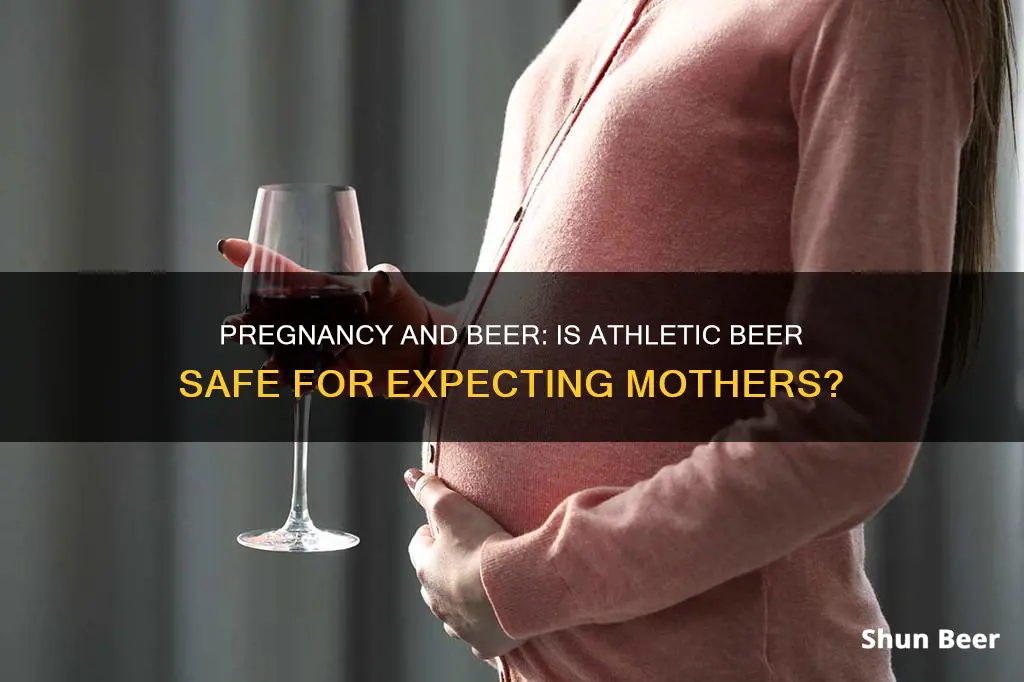
Drinking alcohol during pregnancy is a big no-no. But what about non-alcoholic beer, like Athletic Brewing? Well, it's complicated. Non-alcoholic beers can contain up to 0.5% alcohol, and there's limited research on whether this amount is safe for pregnant women. While some studies suggest light drinking during early pregnancy is fine, there's no clear guideline on how much is okay. Most experts advise that no amount of alcohol is safe during pregnancy. So, while you might be tempted to reach for that Athletic Brewing, it's best to consult your doctor first to weigh the risks and make an informed decision.
| Characteristics | Values |
|---|---|
| Alcohol content | Non-alcoholic beer can contain up to 0.5% alcohol. |
| Safety | There is no evidence to suggest whether non-alcoholic beer is harmful or safe to drink during pregnancy. The American College of Obstetrics and Gynecology (ACOG) says that no amount of alcohol during pregnancy is considered safe. |
| Recommendations | The company does not recommend drinking Athletic Brewing during pregnancy. The CDC and most experts recommend abstaining from alcoholic and non-alcoholic beverages during pregnancy. |
What You'll Learn
- Is non-alcoholic beer safe to drink during pregnancy?
- What are the risks of drinking Athletic Brewing beer while pregnant?
- What are some alternative beverages for pregnant women?
- What is the recommended approach regarding alcohol intake during pregnancy?
- What are the best non-alcoholic beers for pregnancy?

Is non-alcoholic beer safe to drink during pregnancy?
Pregnancy is a time when expectant mothers are particularly conscious of their health and that of their developing baby. It is well-established that consuming alcohol during pregnancy can lead to complications for both the mother and the baby. As a result, many women seek alternatives that allow them to enjoy a refreshing beverage without the associated risks of alcohol. Non-alcoholic beer has emerged as a popular option, but is it truly safe for pregnant women?
Understanding Non-Alcoholic Beer
Non-alcoholic beer is regular beer with an alcohol-by-volume (ABV) of less than 0.5%. It is produced through different methods, including brewing regular beer and then removing the alcohol or halting the fermentation process before it reaches a higher alcohol content. When crafted properly, non-alcoholic beer can taste very similar to its alcoholic counterpart.
The Risks of Alcohol Consumption During Pregnancy
Healthcare professionals widely agree that consuming alcohol during pregnancy can pose serious risks. Alcohol increases the chances of miscarriage, stillbirth, and premature birth. It is also linked to Fetal Alcohol Spectrum Disorders (FASD), a group of conditions causing physical, mental, and behavioural impairments in children exposed to alcohol in the womb.
Given these risks, leading organisations such as the American College of Obstetricians and Gynecologists (ACOG) and the Centers for Disease Control and Prevention (CDC) recommend that pregnant women abstain from alcohol entirely.
Non-Alcoholic Beer: Safe or Not?
Non-alcoholic beer contains minimal alcohol, and expectant mothers often wonder if it is safe to consume during pregnancy. Although legally classified as non-alcoholic if it contains less than 0.5% ABV, this small amount of alcohol can still be present in the final product. While the exact effects of consuming non-alcoholic beer during pregnancy are not well-studied, it is generally recommended to avoid it altogether.
Studies have shown that beverages labelled as non-alcoholic or alcohol-free can still contain trace amounts of alcohol, sometimes exceeding what is declared on the label. This raises concerns about the safety of non-alcoholic beer during pregnancy as a truly alcohol-free option.
Prioritising the Baby's Health
When making decisions about what to consume during pregnancy, prioritising the baby's health is crucial. Even though non-alcoholic beer may seem tempting, it is important to remember that even trace amounts of alcohol can pose risks. To eliminate these risks, experts advise choosing alcohol-free mocktails or drinks labelled as "alcohol-free" rather than non-alcoholic beer. By law, these drinks must contain no detectable alcohol, although it is always recommended to carefully read labels to ensure they state 0.0% alcohol volume.
The Impact of Alcohol on Fetal Development
One of the primary reasons to avoid alcohol during pregnancy is its potential impact on fetal development. Fetuses cannot metabolise alcohol efficiently, so any alcohol consumed by the mother can pass through the placenta and directly affect the baby. This can lead to a range of developmental abnormalities collectively known as fetal alcohol syndrome (FAS). Babies with FAS may experience low birth weight, vision and hearing issues, developmental delays, learning and behavioural difficulties, and an increased vulnerability to substance abuse disorders.
Seeking Professional Advice
While it may be tempting to seek advice from friends, family, or online sources, consulting a healthcare provider for personalised guidance is crucial. Every pregnancy is unique, and a healthcare provider can offer tailored advice based on an individual's medical history and current health status. When it comes to decisions that impact the health of both mother and baby, it is always better to be safe than sorry.
Beer and Azo: What You Need to Know
You may want to see also

What are the risks of drinking Athletic Brewing beer while pregnant?
Drinking Athletic Brewing beer, or any other non-alcoholic beer, while pregnant is not recommended by medical professionals. This is because non-alcoholic beer can still contain up to 0.5% alcohol, and there is no known safe level of alcohol intake during pregnancy.
The American College of Obstetricians and Gynecologists (ACOG) states that no amount of alcohol during pregnancy is considered safe. This is due to the associated risks of fetal alcohol spectrum disorder (FASD), behavioural and learning difficulties, birth defects, and other risks. The Centers for Disease Control and Prevention (CDC) and the American Academy of Pediatrics (AAP) agree that zero alcohol should be consumed during pregnancy.
While it is unlikely that moderate consumption of non-alcoholic beverages would cause harm, there is limited research on the effects of non-alcoholic beer during pregnancy. As such, it is always advisable for pregnant women to consult their physician before making decisions about their diet.
To eliminate any potential risks, it is advisable to choose alcohol-free mocktails or drinks labelled as "alcohol-free" rather than non-alcoholic beer. By law, these drinks must contain no detectable alcohol, although it is still recommended to carefully read the labels to ensure the alcohol volume is 0.0%.
One Beer, No Buzz: Factors Affecting Alcohol Absorption
You may want to see also

What are some alternative beverages for pregnant women?
While it's important to consult a doctor about what to eat and drink during pregnancy, here are some alternative beverages that are considered safe for pregnant women:
Water
Water is the go-to beverage for pregnant women. It helps the body absorb essential nutrients from food and supports healthy fetal circulation. It's also crucial for managing common pregnancy complaints like UTIs, constipation, hemorrhoids, and fatigue. Aim for 10 8-ounce glasses of water per day. To make plain water more interesting, add mint, a squeeze of lemon or lime juice, sliced cucumber, or muddled berries.
Milk
Milk is an excellent source of calcium and protein, which are essential for the baby's growing bones and teeth. Opt for skim or low-fat milk to reduce fat intake. Fortified soy milk is a good alternative for those who are lactose intolerant or prefer a plant-based option.
Ginger Tea
Ginger tea is a tasty and safe option during pregnancy. It can help soothe an unsettled stomach and ease nausea, a common symptom during pregnancy. Brew your own ginger tea by steeping freshly sliced ginger root in boiling water, or choose commercially-available ginger tea bags.
Fruit and Vegetable Smoothies
Blended fruits and vegetables are a delicious way to meet daily nutritional needs and stay hydrated. Include high-water-content fruits and vegetables like watermelon, cucumbers, tomatoes, and oranges. Avoid adding sugar or sweeteners, and use water, milk, or plain yogurt as a base.
Sparkling Water
Sparkling water or seltzer is a great alternative to sugary soft drinks. Add a slice of fresh fruit, a splash of 100% fruit juice, or some muddled berries for a touch of flavor and color.
Fruit and Vegetable Juices
While whole fruits and smoothies are preferable due to their higher fiber content, fruit and vegetable juices can also be a healthy option. Opt for pasteurized juices to avoid harmful bacteria. Pomegranate and orange juice are excellent choices, providing vital nutrients like folate, calcium, vitamin C, and potassium. Dilute fruit juices with water to reduce sugar intake.
Sports Drinks
Sports drinks like Gatorade or Powerade can help replace essential electrolytes, especially if you're experiencing morning sickness or leg cramps. However, consume them in moderation as they tend to be high in added sugar.
Alcohol-Removed Wine
While alcohol should be avoided during pregnancy, alcohol-removed wines can be a safe alternative. These drinks have the alcohol content removed but retain the familiar taste. However, even trace amounts of alcohol may be present, so always check the labels.
Non-Alcoholic Beer
The consumption of non-alcoholic beer during pregnancy is a controversial topic. While some sources advise complete abstinence from alcoholic and non-alcoholic beverages, others suggest that the trace amounts of alcohol in non-alcoholic beer are comparable to the alcohol naturally present in some foods and juices. Consult your doctor before consuming non-alcoholic beer during pregnancy.
Remember, it's always best to consult your healthcare provider to determine what beverages are safe for you and your baby during pregnancy.
Beer: A Friend or Foe for Passing Kidney Stones?
You may want to see also

What is the recommended approach regarding alcohol intake during pregnancy?
Pregnant women are advised to avoid all alcoholic and non-alcoholic beverages. According to the Center for Disease Control (CDC), there is no known safe amount of alcohol to consume during pregnancy. Alcohol can cause problems for the baby throughout the pregnancy, so it is best to avoid alcoholic beverages if you are expecting or even trying to conceive.
Non-alcoholic beverages can contain trace amounts of alcohol, typically less than 0.5%. While it is unlikely that moderate consumption of non-alcoholic drinks would cause harm, it is always advisable for expectant mothers to consult their doctor before making decisions about their diet.
Some research suggests that light drinking during early pregnancy does not have negative effects. However, there is no clear guideline on how much alcohol is considered OK. As a result, most experts maintain that no amount of alcohol should be considered safe during pregnancy.
If you are looking for an alternative to alcoholic drinks during pregnancy, there are many options, including water, milk, fruit juice, and herbal tea.
Beer and Breastfeeding: What's Safe?
You may want to see also

What are the best non-alcoholic beers for pregnancy?
It is important to note that there is no safe level of alcohol intake during pregnancy or breastfeeding, and abstinence from alcoholic and non-alcoholic beverages is always the safest approach. While it is unlikely that moderate intake of non-alcoholic beverages would pose any harm, it is always advisable for expectant mothers to consult their physician before making decisions about their diet.
Non-alcoholic beers can contain up to 0.5% alcohol by volume (ABV), and there is limited research on whether non-alcoholic beer is harmful or safe to drink during pregnancy. The American College of Obstetrics and Gynecology (ACOG) states that no amount of alcohol during pregnancy is considered safe as it is linked to behavioural and learning difficulties, birth defects, fetal alcohol spectrum disorder (FASD), and other risks.
If you are looking for non-alcoholic beverages with absolutely no alcohol, there are several options available. Hairless Dog and Heineken 0.0% are classic choices for non-alcoholic beers. However, keep in mind that even though the label claims to be 0.0%, beers claiming to be alcohol-free can still contain trace amounts.
If you want to explore alcohol-free options beyond beer, Grüvi Prosecco and Grüvi Bubbly Rosé are completely alcohol-free and made without any fermentation. You can also get creative and make your own mocktails using sparkling water, juices, and other fun ingredients.
Bravo Capsule and Beer: A Safe Mix?
You may want to see also
Frequently asked questions
There is no safe level of alcohol intake during pregnancy or breastfeeding, so abstinence from alcoholic and non-alcoholic beverages is always the safest approach. However, non-alcoholic beers typically contain less than 0.5% alcohol by volume (ABV), which is less than the amount of alcohol found in some everyday foods and drinks. Ultimately, it is a personal choice and you should consult your doctor before making decisions about your diet.
The main concern with drinking athletic beer while pregnant is the presence of alcohol, which can cross the placenta and impact the development of the fetus. Additionally, pregnant women are advised to avoid all unnecessary alcohol consumption as there is no safe level of alcohol consumption during pregnancy.
There are many alternative beverages for pregnant women, including water, milk, fruit juice, and herbal tea.







